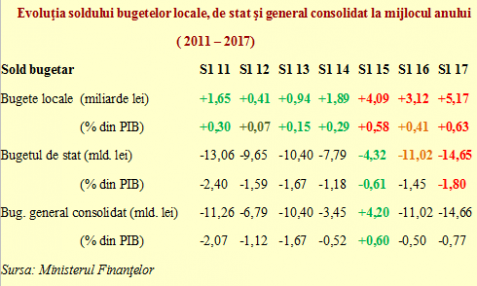 The surplus recorded at the end of the first six months of 2017 in the centralized budget of local administrative units (in short, local budgets) climbed to the highest level in the last seven years, according to the official data available on the website of the Ministry of Finance as recorded in the middle of the years analysed.
The surplus recorded at the end of the first six months of 2017 in the centralized budget of local administrative units (in short, local budgets) climbed to the highest level in the last seven years, according to the official data available on the website of the Ministry of Finance as recorded in the middle of the years analysed.
The manoeuvre of maintaining a surplus in local budgets to offset the chronic state budget deficit, which has already become a habit of the fiscal policymakers, is not new but the magnitude it reached, this time without being able to keep under control the deficit which it should have tempered, would be a matter of concern (see the table).
*
- Evolution of the balance of local budgets, state and general consolidated budgets in mid-year (2011-2017)
- Budget balance
- Local budgets (billion lei) (% of GDP)
- State budget (billion lei) (% of GDP)
- General consolidated budget (billion lei) (% of GDP)
- Source: Ministry of Finance
*
As a very important technical note, it should be mentioned that the state budget represents only about half of the general consolidated budget. The latter is complemented by several other budgets (state social insurance, health insurance, unemployment budgets, etc.) and is the one publicised.
The explanation, the consolidated general budget should have met the threshold of -1% of GDP assumed by Romania in 2013 through the so-called fiscal compact, and it should have systematically passed the 3% of GDP deficit test to be able to access the Eurozone and not enter the EU penalty procedures.
How spending of a little town influences general deficit
Going back to local budgets, as the state can cover neither the pensions nor the health expenses from the amounts collected for specific purposes, it transfers money from the state budget concealed as subsidies to cover the deficits of these two major state social services.
After that, to obtain money elsewhere and limit the overall deficit in the state finances, it „limits” more or less local spending. The idea is to get a local surplus to compensate, as far as possible, for the gap created by the insufficient collection and/or the hazardous reduction of taxation.
From the centralized data, we can notice that the lowest level of mid-year surplus in local budgets (at the end, they quit hold of spending based on the deficit of the general consolidated budget and the relationship that local authorities have with central authorities) has been recorded on July 1, 2012 (only + 0.07% of GDP).
If you remember, it was also the time when the idea of ending the unbalanced budget implementation, with much higher deficits in the second half of the year, and maintaining a steady rhythm of budget spending as much as possible, including at the local level, to also stimulate the real autonomy of the administrative units, etc.
After that, the trend has been reversed and the leap back has been made in 2015, to the forced high levels of the surplus in local budgets (almost double compared to the previous year). It was in vain to try tempering this manner of working in 2016, during the technocrat cabinet, because new political forces have come to power, and we found ourselves facing „Scheme 14” or „Scheme 14plus” in 2017.
But, beware, not as in 2015, when the surplus of local budgets, in a more intelligent and responsible manner, has been practically converted to a (temporary) surplus at the national level. The unavoidable return by the end of the year has been mitigated and the result of -0.8% of GDP deficit remains a notable performance for a long time from now on.
Basically, the state budget has returned to a worrying negative level following the need to make assumed subsidies to support questionable wage and pension increases, significantly above the levels of 2012 and 2013. With the mention that in 2018 we are heading, despite our record growth, toward the crisis level registered in 2011.
On the social ethic side, we can refer to the joke with Stalin’s goose, which some people remember, and others will understand harder and hopelessly late (which is why we do not even say it). It is certain that we are interested in the economy, a field in which those who are more skilful are rather politically interested to exploit the ignorance than to explain the optimal decisions.










